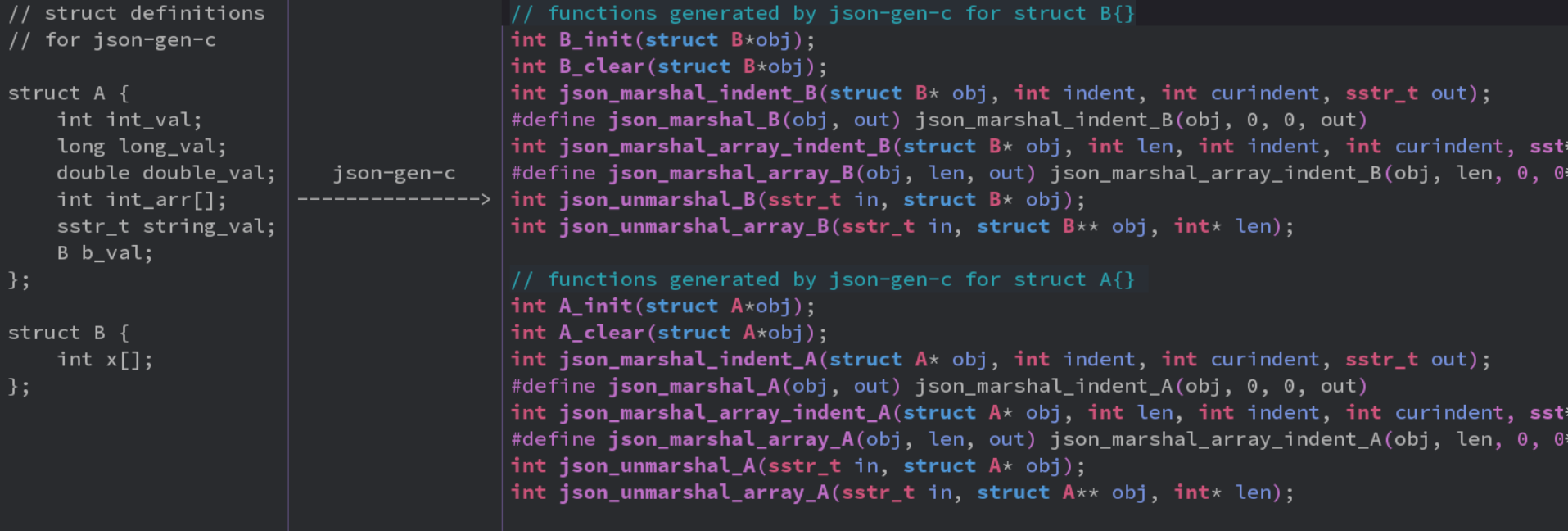json-gen-c is a program for searializing C struct to JSON and
deserializing JSON to C struct back. It parse structs' definition files
then generate C codes to serialize and deserialize structs.
make
sudo make installTo build example, tests, and benchmarks
# build ./target/example
make example
# build ./target/test/unit_test
make test
# build ./target/benchmark/json_bench
make benchmarkFor example, create a file name struct.json-gen-c as contents below:
struct A {
int int_val1;
int int_val2;
long long_val;
double double_val;
float float_val;
sstr_t sstr_val;
int int_val_array[];
B b_val;
};
struct B {
int id;
};Note that we don't use C-style string char*, a more resonable type is
sstr_t. You can find more details about sstr_t in
document of sstr.
json-gen-c -in struct.json-gen-c -out .This generates the following files in your specified destination directory:
json.gen.h, the header which declares your generated structures and functions.json.gen.c, which contains the implementation of your functions.sstr.h,sstr.c, the string manipulation helper functions that generated code depends on.
struct A a;
A_init(&a);
// set values to a ...
// ...
sstr_t json_str = sstr_new();
json_marshal_A(&a, json_str);
printf("marshal a to json> %s\n", sstr_cstr(json_str));
sstr_free(json_str);
A_clear(&a);struct A a[3];
for (i = 0; i < 3; ++i) {
A_init(&a[i]);
// set values to a[i] ...
}
sstr_t json_str = sstr_new();
json_marshal_array_A(a, 3, json_str);
printf("marshal a[] to json> %s\n", sstr_cstr(json_str));
for (i = 0; i < 3; ++i) {
A_clear(&a[i]);
}// const char *p_str = "{this is a json string}";
// sstr_t json_str = sstr(pstr);
struct A a;
A_init(&a);
json_unmarshal_A(json_str, &a); // json_str is a type of sstr_t
// ...
A_clear(&a);// const char *p_str = "[this is a json string]";
// sstr_t json_str = sstr(pstr);
struct A *a = NULL;
int len = 0;
json_unmarshal_array_A(&a, &len, json_str);
// ...
int i;
for (i = 0; i < len; ++i) {
A_clear(&a[i]);
}
free(a);Define a struct like:
struct <struct_name> {
<field_type> <field_name> []?;
<field_type> <field_name> []?;
...
};
The field type can be one of the following:
intlongfloatdoublesstr_tbool- a struct name
If a field is an array, just append [] after the field name.
// initialize a struct
// always return 0
int <struct_name>_init(struct <struct_name> *obj);
// uninitialize a struct
// always return 0
int <struct_name>_clear(struct <struct_name> *obj);
// marshal a struct to json string.
// return 0 if success.
int json_marshal_<struct_name>(struct <struct_name>*obj, sstr_t out);
// marshal an array of struct to json string.
// return 0 if success.
int json_marshal_array_<struct_name>(struct <struct_name>*obj, int len, sstr_t out);
// unmarshal a json string to a struct.
// return 0 if success.
int json_unmarshal_<struct_name>(sstr_t in, struct <struct_name>*obj);
// unmarshal a json string to array of struct
// return 0 if success.
int json_unmarshal_<struct_name>(sstr_t in, struct <struct_name>**obj, int *len);Codes of json-gen-c are licensed under GPL-3.0, except for the codes it
generated. The copy right of the codes generated by json-gen-c is owned
by the user who wrote the struct definition file, same as the copy right of
a PDF file generated by Latex is owned by the user who wrote the tex file.
